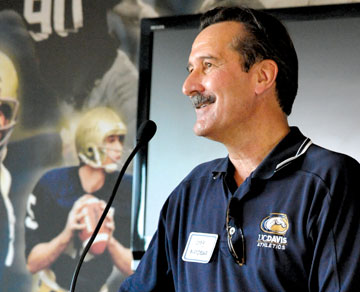Volume 29 · Number 1 · Fall 2011
Sports: Game Changer

Greg Warzecka
From Division I transition to scholarships for student-athletes, Greg Warzecka had a vision for UC Davis athletics.
By Mike Robles
When Greg Warzecka became athletics director in 1995, UC Davis was still reeling from a budget crisis that just two years earlier had threatened the athletics program's very existence. Still, he moved forward with purpose and optimism—proposing that UC Davis offer athletic scholarships that would usher in a new era for Aggie sports.
"Our whole vision for the future was about rebuilding the support system for student-athletes," recalls Warzecka, who retired this summer and whose immediate plans include spending more time with his family.
That vision of supporting student-athletes, he said, guided him throughout his 16-year tenure. During his watch, the athletics department experienced unprecedented growth, both in size and success. UC Davis moved from no scholarships to more than $6 million in athletics grants, from worn Toomey Field to $30 million Aggie Stadium, from NCAA Division II to Division I.
Three teams—men's basketball (1998), rowing (2002, 2003) and softball (2003)—won Division II championships, an impressive three Aggies were named NCAA Woman of the Year winners, and last season the women's basketball team made a historic appearance in the NCAA Division I Tournament. Altogether, UC Davis won six Directors' Cups in eight years as the most successful Division II athletics program in the country. And that's just for starters.
Bob Biggs, head UC Davis football coach, said of Warzecka, "He laid a wonderful foundation for the athletics department. He always had the best interests of the coaching staff, the program, the student-athletes and, ultimately, the university in mind."
Warzecka, however, takes only a portion of credit for the transformation, noting the contributions of others.
"We're always trying to do as much as we can for the student-athletes' welfare and to provide them an atmosphere where they can develop all of their talents, academically and athletically, and to experience success," he said.
Historic transformations
Legacy for
student-athletes
To see the real-life impacts of the Greg Warzecka era in Aggie athletics, look to the everyday experiences of student-athletes. More…
Not long before Warzecka arrived on campus from University of Redlands, UC Davis students had voted to raise their own fees to help save the athletics program. One of Warzecka's first actions as the new athletics director was proposing an end to the Aggies' long-standing nonscholarship tradition. He believed it was becoming more difficult to attract talented, high-achieving student-athletes, and athletics grants are a key to building a competitive program. In 1998,
UC Davis offered a total of $500,000 in aid, and today provides more than 12 times that amount.
Improving facilities was also a top priority. Since 1949, the football team had been playing at Toomey Field, which had become less than ideal for hosting games. The swimming and water polo teams used Hickey Pool, which was more than 60 years old. Other venues needed help as well. In 1999, students—who had come to the aid of athletics during the budget crisis of the early 1990s—once again voted to raise their own fees. The student-approved Facilities And Campus Expansion Initiative provided funding for a new Aggie Stadium and help for the Ted and Rand Schaal Aquatics Center.
Soon enough, UC Davis eyed Division I, as it outgrew Division II. In 2003, the campus moved to the Big West Conference and began a four-year transition to Division I. "When I look back, it's probably the one thing I reflect on as the biggest accomplishment because it was the most difficult one," Warzecka said. "We had to climb a mountain."
Warzecka also oversaw the addition of new teams in women's rowing, water polo and lacrosse, and then added or brought back others in indoor track, golf and field hockey. But he agonized over the discontinuation of women's rowing, men's wrestling, men's swimming and diving, and men's indoor track and field teams during a budget crisis in 2010.
Still, he believes that UC Davis athletics teams—especially the student-athletes—are in great shape upon his departure.
"I tried to do the best [I could] so that each and every student competing in their respective sports would have a championship experience at least once during their undergraduate career," he said.
